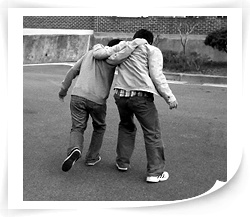This chapter discusses how humans tend to adapt to certain environment for their survivals. Early in the chapter, Primo Levi described the cruel conditions that Jews had to confront in concentration camps. As the title, “on the bottom” suggests, the “bottom” in this chapter symbolizes the desperate situation that Jews had to undergo in concentration camps. For instance, the Jews were not given fresh water to drink, rather, they were only given dirty water with which they were only able to run the water in their mouth to satisfy the gist of thirst they experienced. Daily routine was a pain for the prisoners, because the fact that they lacked the supply of fresh water was like a torture for them. Furthermore, I think the word “bottom,” contains another meaning that Primo Levi tried to describe. The “bottom” symbolizes to the treacherous actions that prisoners did for their own survival.
In the book, many prisoners in the camps were persecuted mainly from the belief that they are Jews; however, some of the Jews were treacherous enough that when it came to the matter of survival, they betrayed their beliefs and persecuted their own fellow believers. The populations varied in the camps, people were concentrated in camps from many different boundaries that they came from different parts of Europe and the people who were loyal to the Germans were awarded to certain positions that they would not have to work as the others do. However, the consequence for that was that they had to be harsh to other prisoners in order to keep their position. In order to remain in their status, they had to treat their fellow believers as harshly as Nazis treated them.
Although, it is emotionally appealing to criticize the people who betrayed their belief and fellowmen for their own survivals, but in my opinion, it is not our option to criticize them, rather, we have to protect them and comfort them with our concerns because we had never been to those desperate situations as they were in.
Tuesday, February 27, 2007
Subscribe to:
Post Comments (Atom)

No comments:
Post a Comment